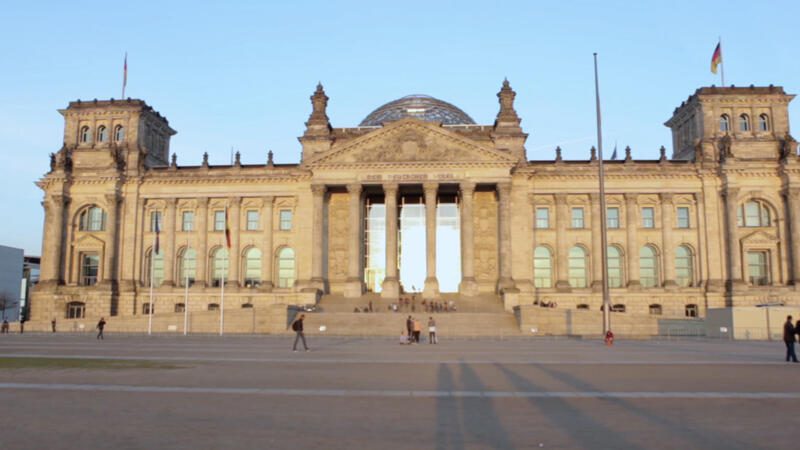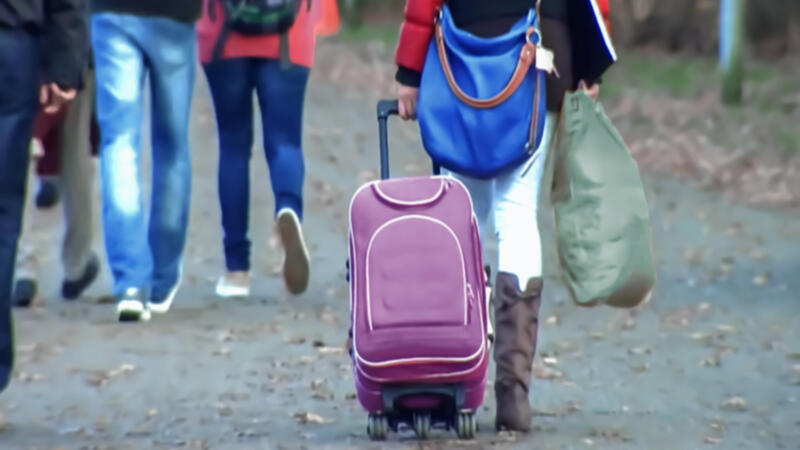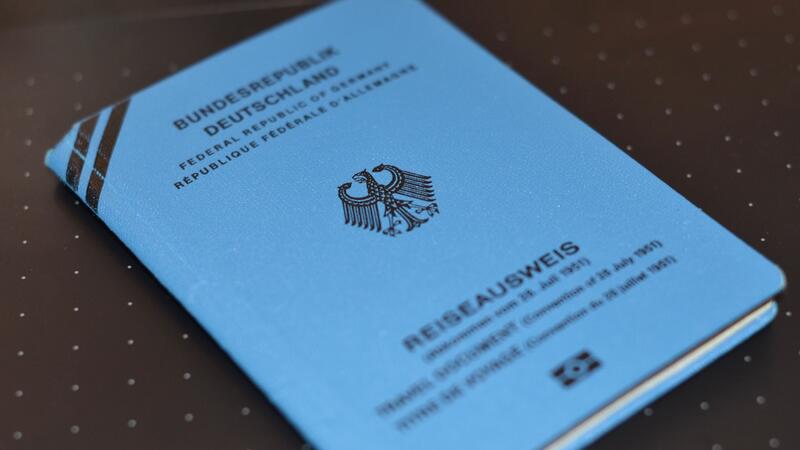Residence Permits for Refugees
What types of residence permit exist?
If you have fled to Germany for political or humanitarian reasons and would like to stay here, you can apply for asylum. If your asylum application is accepted, you will be issued a residence permit. In Germany, there are three main forms of protection for refugees. As an asylum seeker, you may be recognised as being entitled to asylum, refugee status or subsidiary protection. In addition, the BAMF can also issue you a National Ban on Deportation ("nationales Abschiebungsverbot"). In this case, you will also receive a residence permit.
Forms of protection and essential questions about residence permits
According to Article 16a of the Basic Law, asylum is granted to individuals who are politically persecuted in their home country by the state or a state-related organisation. Political persecution refers to the situation in which a person is at risk or imprisoned because of his/her "race," religion, nationality, political belief, or association with a particular social group. However, recognition as being entitled to asylum is only possible if you have not entered Germany via a safe third country. Since Germany is surrounded by European countries (i.e. safe third states), recognition is only possible if you directly travel to Germany by plane.
Recognised asylum seekers are issued residence permits which are valid for three years. If the situation in their home country does not improve, the residence permit will be extended for another three years. You can read more about the topic in the section "How can I extend my residence permit?". After three years (at the earliest), under certain conditions, you can apply for and obtain a permanent residence permit ("unbefristete Aufenthaltserlaubnis" or "Niederlassungserlaubnis"). For more information, read the chapter "Permanent Residence Permit".
Recognised asylum seekers are entitled to a "Refugee Travel Document" ("GFK-pass"). You can use this passport to travel abroad. You are not permitted to go to your home country, however, as you may lose your German residence permit.
As a person entitled to asylum, you also have the following rights:
- You can bring your spouse and minor children to Germany. As an unmarried minor, you can bring your parents to Germany. (Family Reunification)
- You are allowed to work. If you do not have a job, you will receive unemployment benefit II or social assistance. The Jobcentre helps you find a job.
- You are entitled to child and parental allowance.
- You are allowed to attend an integration course.
- You can study or take part in vocational training programmes.
Important:
You will not be recognised as being entitled to asylum if there is another region in your homeland you can reach legally and live in safety.
People who have committed war crimes or severe non-political offences (outside of Germany) which violate the objectives and principles of the United Nations, may not be granted asylum. The same applies to people who have been sentenced to imprisonment for non-political crimes if they are perceived as a threat to Germany or the public.
Recognised refugees (§ 3 par.1 Residence Act) have the same rights as those entitled to asylum. Refugee status is granted to individuals who have been persecuted for their "race", religion, nationality, political beliefs or association with a particular social group in their home country. A person may be subject to persecution by state or non-state groups, as long as the state in their home country does not protect them from harm. You may be granted refugee status, even if you have entered Germany via a safe third country; unlike entitlement to asylum, for refugee status, you should not have directly arrived in Germany by plane.
Recognised refugees are issued a residence permit, which is valid for three years. If the situation in their home country does not improve, the residence permit will be extended for another three years. You can read more about this in the section "How can I extend my residence permit?". After three years (at the earliest), under certain conditions, you can apply for and obtain a permanent residence permit ("unbefristete Aufenthaltserlaubnis" or "Niederlassungserlaubnis"). For more information, read the chapter "Permanent Residence Permit".
Recognised refugees are also entitled to a "Refugee Travel Document" ("GFK-Pass"), with which they can travel abroad. As a recognised refugee, however, you cannot go to your home country, as you may lose your German residence permit.
Recognised refugees are also entitled to the following rights:
- You are allowed to bring your spouse and minor children to Germany. As an unmarried minor, you can have your parents join you. (Read more in our chapter "Family Reunification")
- You are permitted to work. If you do not have a job, you will receive unemployment benefit II or social assistance, and the jobcentre will help you find a job.
- You are entitled to child and parental allowance.
- You can attend an integration course.
- You can study or participate in a vocational training programme.
Important: You will not be recognised as a refugee if there is another region in your homeland you can reach legally and live in safety.
People who have committed war crimes or severe non-political offences (outside Germany) which violate the objectives and principles of the United Nations, may not be granted refugee protection. The same applies to people who have been sentenced to imprisonment for non-political crimes if they are perceived as a threat to Germany or the public.
Individuals who are not recognised as being entitled to asylum or refugee status may be granted subsidiary protection (§ 4 par. 1 Asylum Act). Subsidiary protection can apply to individuals who do not personally face persecution but are in grave danger, e.g. due to war or severe human rights abuses (such as the death penalty, torture, or inhumane treatment).
Individuals entitled to subsidiary protection receive a residence permit which is valid for one year. The permit can be extended for two more years if the situation in the home country does not improve. You can read more on the topic in the section "How can I extend my residence permit?". After five years (at the earliest), under certain conditions, you can apply for and obtain a permanent residence permit ("unbefristete Aufenthaltserlaubnis"). For more information, read the chapter "Permanent Residence Permit".
The legal status of subsidiary protection beneficiaries is not the same as that of refugees or people with asylum rights. As an individual entitled to subsidiary protection, you have no claim to a "Refugee Travel Document" ("GFP-Pass").
As a beneficiary of subsidiary protection, you have the following rights:
- You are entitled to work. If you do not have a job, you will receive unemployment benefit II or social assistance; and the Jobcentre will help you find a job.
- You are entitled to child and parental allowance.
- You can attend an integration course.
- You are allowed to study and participate in vocational training programmes.
To learn more about the regulations regarding family reunification for individuals with subsidiary protection, visit the chapter on Family Reunification.
If you are not recognised as a person entitled to asylum, a refugee status or subsidiary protection, it will still be examined whether you may stay in Germany for other reasons. In principle, you should not be deported if you are at risk of human rights abuse or may face a serious danger to your life, limb or freedom in your home country (§ 60 (5) or (7) Residence Act). That may be the case, for instance, if you have a serious illness that cannot be treated in your home country. People who have been issued a national ban on deportation will be granted a residence permit which is valid for one year. If the situation does not improve, the permit will be extended. Learn more about the subject in the section "How can I extend my residence permit?". After five years (at the earliest) and under certain conditions, you can apply for and obtain a permanent residence permit ("unbefristete Aufenthaltserlaubnis"). You can read more about this in the section "How and when can I get a permanent residence permit?"
You are not entitled to receive a "Refugee Travel Document" (GFK-passport). If you do not have a passport from your home country or cannot apply for one, you can apply for a "travel document for foreign nationals and stateless persons" (also known as a "grey passport") at the Immigration Office. To do so, you must be able to prove that it is not possible or reasonable for you to obtain a passport from your home country.
With a national ban on deportation, you have the following rights:
- You are entitled to work. If you do not have a job, you will receive unemployment benefit II or social assistance; and the Jobcentre will help you find a job.
- You are entitled to child and parental allowance.
- You can attend an integration course.
- You are allowed to study and participate in vocational training programmes.
To learn more about the regulations regarding family reunification for individuals with subsidiary protection, visit the chapter on Family Reunification.
As a recognised refugee or an individual entitled to asylum, you will be issued a residence permit which is valid for three years. The residence permit issued for individuals with subsidiary protection or a national ban on deportation is, in principle, valid for one year. If you want to stay in Germany after this initial period, you must have your residence permit extended. To do so, you need an appointment with the relevant Immigration Office ("Ausländerbehörde").
In this appointment, you must present the following documents:
- Your residence permit and your passport
- A biometric passport photo
- Your employment contract and proof of income for the previous three months (alternatively, a report from your tax adviser or a notice from the Jobcentre/Social Welfare Office)
- The confirmation of registration from the municipality ("Meldebestätigung").
Make an appointment at the Immigration Office ("Ausländerbehörde") in due time before your residence permit expires.
You can also renew your passport at the same time. There is a fee to be paid for the renewal of the residence permit and the passport.
Important:
You can only extend your residence permit if the BAMF has not renounced your entitlement to refugee protection, asylum, subsidiary protection or national ban on deportation. For detailed information, look at the section "Can I lose my residence permit?”.
- The BAMF can revoke your asylum/refugee status, subsidiary protection or National Ban on Deportation. In the case of individuals who have been granted asylum or refugee status, the BAMF usually examines whether the reasons that led to the recognition are still relevant after three years. If your personal circumstances (e.g. health conditions) or the situation in your home country dramatically improves, the BAMF may renounce your entitlement to protection. If so, the Immigration Office may revoke (or refuse to renew) your residence permit.
- If you have been granted a permanent residence permit based on your recognition as a refugee or your entitlement to asylum, subsidiary protection or national ban on deportation- travelling to your home country may lead to the revocation of your protection. The same applies to recognised refugees and individuals entitled to asylum who visit their homeland’s embassy. If your recognition is revoked, this entails the loss of the residence permit. The immigration office, however, will check if you can be granted another residence permit. If this is not the case, in principle, you have to leave Germany. (§52 I Residence Act)
Exception: If you only travel to your home country for a short time and for a legitimate reason (e.g. to visit your critically-ill mother), the Immigration Office may decide not to revoke your recognition
- If you have a residence permit but do not reside in Germany for more than 6 months or move to another country, in principle, you will lose your residence permit (§ 51 I Residence Act).
- Your residence permit may be revoked if you have obtained it as a result of providing false information to the authorities. If you are considered to be a threat to public safety and order, you may be deported. In this case, you will also lose your residence permit/settlement permit.
- If you are at risk of losing your recognition or residence permit, seek advice from a counselling centre or lawyer.
- You can find lawyers and counselling centres in your area on our local information page. Enter the name of your city and search for asylum, residence or legal counselling services nearby.
Important
Even if you have not been granted any of the three forms of protection, nor issued a national ban on deportation, you still have some options that allow you to stay in Germany. Read more in our chapter "Asylum Application Rejected".








